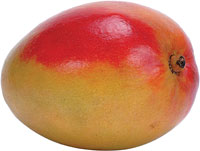The first study presented at the meeting suggests that individuals who consume mangos tend to have a better diet than consumers who do not. The researchers compared the diets of over 13,000 individuals participating in the National Health and Nutrition Examination Survey (NHANES) between 2001 and 2008 to the Healthy Eating Index (HEI), a quantitative measure of diet quality relative to federal dietary guidance. They found that those that regularly ate mangos scored higher on the HEI than those that did not.
Mango consumption was also compared to overall nutrient intake and physical health. Compared to non-mango consumers, mango consumers had, on average, significantly increased intake of vitamin C, magnesium, potassium and dietary fiber, while having lower intake of sodium and total fat. In addition, they had a lower average body weight.
Additionally, lower C-reactive protein levels were found in adults who added mango to their diet. C-reactive protein measures inflammation and it has been suggested that high levels of it in the blood are linked to increased risk for heart disease, however the evidence is inconclusive. Additional research is needed to determine whether the lower levels of C-reactive protein are attributable to mango consumption or other factors.
“We found that adults who ate mangos tended to have a lower body weight, higher intake of fiber and lower intake of fat, all of which are associated with better cardiovascular health,” stated Dr. Victor Fulgoni, of Nutrition Impact, LLC and lead researcher on this study. The National Mango Board funded this research with the goal of better understanding how mangos can promote healthy diets.
Phytochemicals found in mangos may target breast cancer cells
Another exploratory study presented at FASEB this week and conducted by researchers at Texas A&M University discovered that a polyphenolic compound found in Keitt mangos may be toxic to breast cancer cells. The study, done in vitro (in cells) and in mice, found decreased proliferation of breast cancer cells treated with the polyphenolic extract, and reduced tumor size and weight in mice. Though more research is needed, including human clinical trials, researchers hypothesize that the effects of the polyphenolic extract might extend to the consumption of fresh mango.
“In summary, the anti-carcinogenic and anti-inflammatory activity of mango polyphenolics in breast cancer cells were at least in part due to targeting proteins that play an important role in the survival of breast cancer cells,” noted one of the study’s lead researchers, Dr. Susanne Talcott. “The ability for bioactive components in mangos to reduce cancer promoting cells may be the next big thing in the battle against breast cancer, but more research is needed at this time.”
From the April 24, 2012, Prepared Foods’ Daily News
